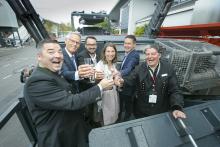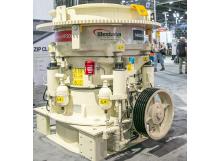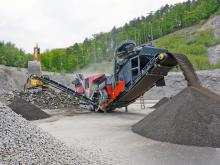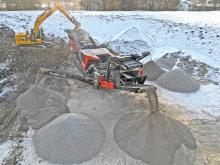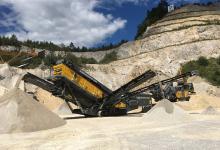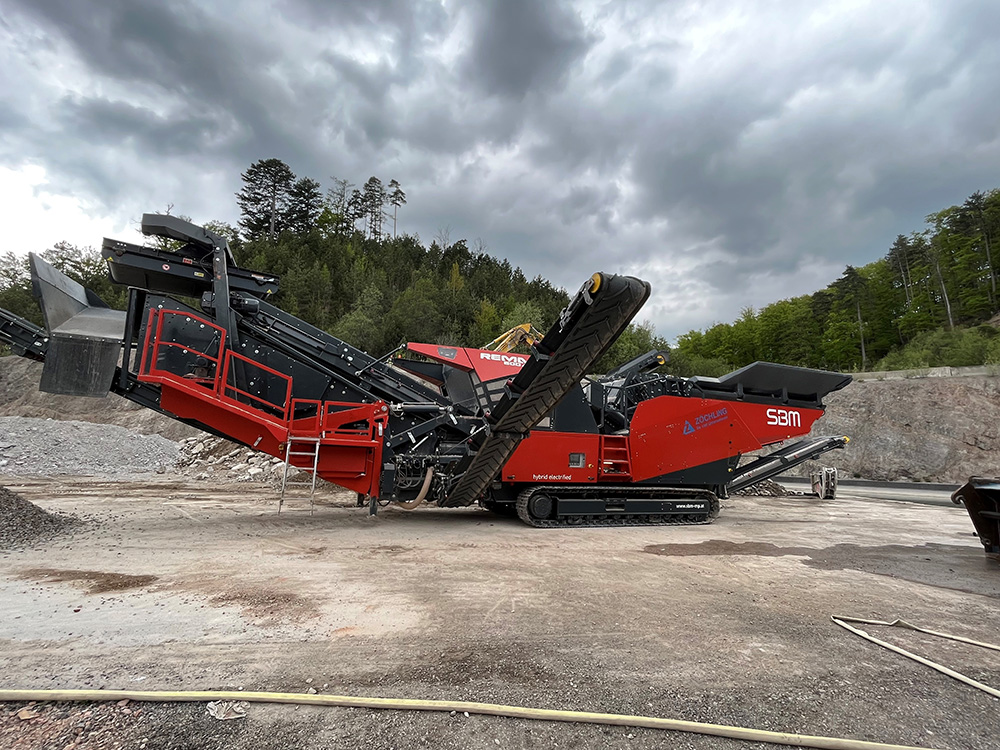
More than 170 visitors to the Ramsau quarry in Lower Austria recently got an insight into the potential future of the crushing and screening equipment industry. The quarry - operated by Hans Zöchling GmbH - was the venue for the official launch of SBM Mineral Processing’s revolutionary new REMAX 600 track-mounted impact crusher, which features AI capability.
The machine was a major attraction at the 2022 edition of bauma, and the Ramsau event featured performance demos in natural stone and typical recycling materials that demonstrated the all-round qualities of the new 600 t/h crusher.
SBM cooperation partners from the University of Leoben (Montanuniversität of Leoben) gave insights into the ongoing development work around AI-based "autonomous crushing", which should soon be possible with the REMAX 600 and other SBM plants.
Helmut Haider, SBM sales director processing, says that more than three years of intensive development work by SBM and external experts have gone into the new machine.
"We have once again delivered on time," says Haider in view of the closely timed model premieres in recent years, with which the processing specialist has expanded its range of track-mounted JAWMAX jaw crushers and REMAX impact crushers into a highly up-to-date, well-rounded portfolio with six models each ranging from 23 to 160 tonnes transport weight. With the exception of the large jaw crusher JAWMAX 800, all models offer compact dimensions for economical one-piece transport, despite the diesel-electric hybrid drive with plug-in option and largely class-leading crushing and screening equipment.
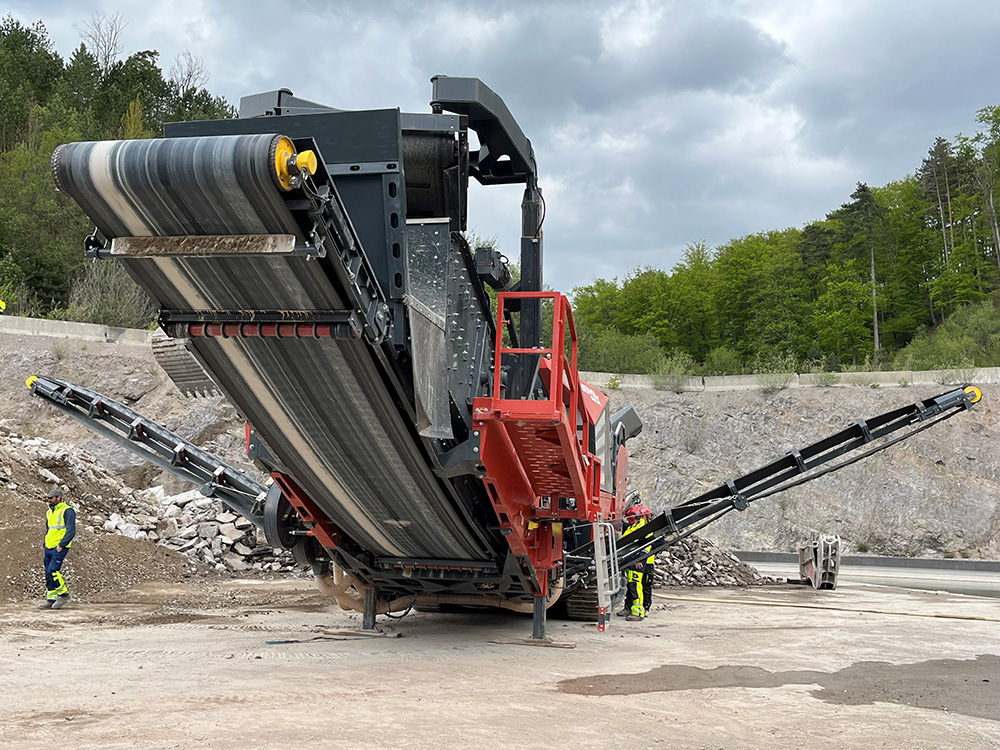
SBM has been collaborating for several years with, among others, the Innovation Centre for Raw Materials (IZR) at the University of Leoben. The cooperation with the university has featured computer-aided or experimental validation of new or further developed processing solutions and components from SBM’s own R&D department at its headquarters in Oberweis, Austria.
The aim is to develop "intelligent", self-learning mobile crushers that enable the decisive step from crushing, which is already largely monitored and optimised in terms of the interaction of all process steps, to autonomous, fully-automated production. The first milestone and ideal technology carrier for further development is the now market-ready "conventional" REMAX 600 with its extensive technical equipment, the further optimised electric drive and the latest generation of the CRUSH CONTROL machine-control system, which already processes a large part of the machine data generated today.
The teams are currently working on the development of the advanced sensor technology that will enable the machine to automatically detect the type and composition of the feed material and the particle-size distribution of the end products. Together with the load conditions of the crusher and conveyors, which are also determined in real time, the CRUSH CONTROL system transmits all the values determined in the field via a cloud solution to the SBM headquarters. A ‘digital twin’ created there compares the actual machine performance with thousands of stored reference data from 1:1 quality tests, laboratory tests and computer simulations (rock properties, grading curves, particle shapes, etc.). The resulting optimisation potential is fed back into the machine's control system and, thanks to innovative machine-technology solutions, enables all process stages, right down to the air classifier and magnetic discharge, to be adjusted immediately and continuously on-site without interrupting operation.
According to SBM, autonomous crushing is designed to provide significant support and relief for operators and operating personnel: for example, the system can be configured precisely to requirements on a data-based basis, even before a change of location or material, through the correct selection of screening media. An interactive menu-control system allows even inexperienced operators to set up production precisely, depending on whether maximum output, minimum fuel consumption (‘eco-mode’) or optimised production of certain valuable aggregates is required. A new type of integrated tool monitoring in the impact crusher also helps to reduce quality losses due to wear during production and provides important support for predictive maintenance.
With the newly-developed REMAX 600, SBM Mineral Processing relied on the highly mobile plant concept, which offers natural stone producers and recycling companies alike the full flexibility and high productivity of a large impact crusher.
SBM says the REMAX 600 defines a completely new performance segment in mobile primary and secondary crushing with the 600tph of its further developed 1400 impact crusher 13/14/4 with an intake of 1,380mm x 1,000mm (W x H) for feed sizes up to 900mm. Up to five high-quality fractions can be produced in one pass, thanks to efficient pre-screening, triple air classifying and high-efficiency magnetic separation, as well as the optional single/dual/triple-deck secondary screen.
Depending on the equipment, the REMAX 600 only weighs between 60 and 80 tonnes on the low bed – even when fully equipped, the machine measures a slender 22.0m x 3.49m x 3.80m (LxWxH).
The REMAX 600 is designed to offer a complete package of standard and optional equipment that ensures high added value through a variety of high-quality end products. In addition to the standard pre-screening via a double-deck circular vibratory screen (W: 1,300mm x L: 2,400mm), these include in particular the three optional circular vibratory post-screening units (1, 2, 3 deck; W: 1,800mm x L: 5,500mm) – each with oversize return and high-projecting discharge conveyors for large product stockpiles. According to SBM, a real innovation in this machine class is the highly efficient overbelt magnet with longitudinal discharge, which guarantees high purity of the end products, especially in recycling.
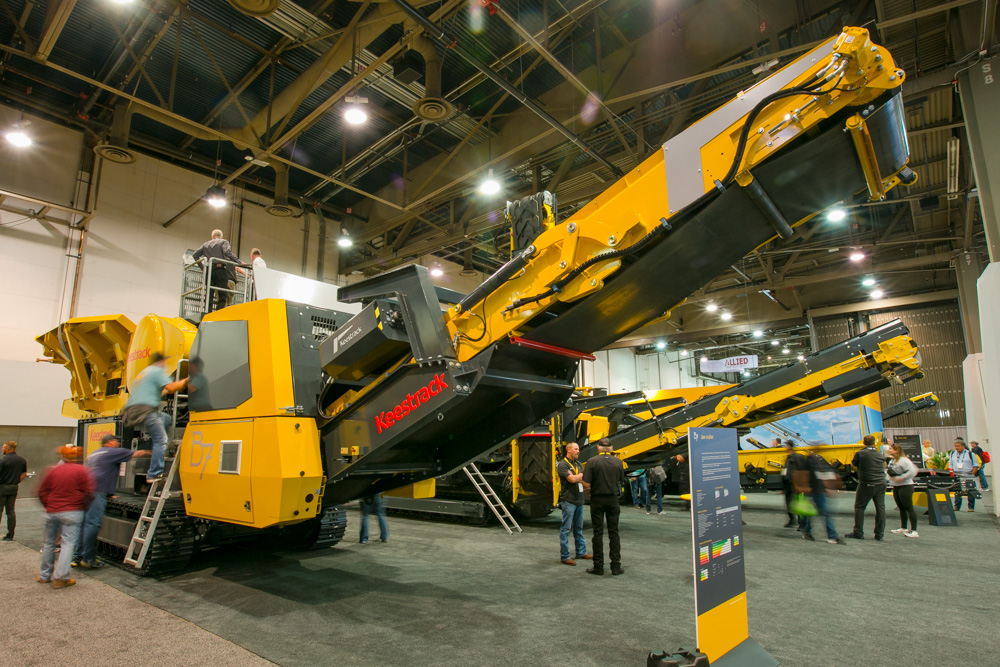
All equipment and the side walls of the 9m³ feed hopper can be hydraulically folded in and remain on the machine.
SBM says this means that, even in one-person operation, the column-free system can be set up quickly without the need for additional tools. The operator is supported by the start-up routines of the SBM CRUSH CONTROL system, with its central 25cm-display, multi-function radio remote -control and cloud-based remote access to all operating states via smartphone or tablet.
As with all SBM mobile plants, the REMAX 600 features a fuel-efficient diesel-electric hybrid drive with optional mains operation: a compact unit consisting of a 15-litre Cummins turbo diesel (EU-V) and a 553kVa generator supplies all electric drives – from the 250kW electric motor of the crusher, to the complete conveying and screening technology, to the two electrically driven hydraulic units of the undercarriage and working hydraulics.
Thanks to this design, all plant functions remain available even in fully electric mains operation, which SBM says significantly reduces on-site emissions (exhaust gases, noise) compared to other hybrid concepts with short-term diesel intervention. The high-torque drive at permanently low speeds is also impressive in diesel-supported operation, which, in addition to the low environmental impact, results above all in favourable fuel consumption, even when all the auxiliary units are working at high capacity.
According to SBM, the field tests , carried out since the beginning of this year by cooperation partner Hans Zöchling GmbH under construction-site conditions in the Ramsau quarry and adjacent recycling depots with several tens of thousands of tonnes of a wide variety of raw materials , have resulted in economic average values of 34–46 l/h diesel or an electricity consumption of 140–200kWh.
"This SBM-typical consumption advantage was undoubtedly one of the reasons why the enthusiasm felt at the BAUMA trade fair very quickly turned into real interest and concrete orders long before the market launch," Haider says. "In addition to our own dealers, the first end customers have already signed up – we assume that we may significantly adjust our production plans for the REMAX 600 upwards next year."
Belgium-based Keestrack is launching a new B7H heavy-duty hydraulic jaw crusher, specially designed for the US market and the toughest of rock conditions in quarrying and mining applications.
The 70-tonne B7H hydraulic jaw crusher has a 30-tonne jaw and is adapted from Keestrack’s existing B7 electric jaw crusher which was launched in 2018.
It has a vibrating feeder with 2-step grizzly of 2,200mm x 1,080mm (LxW) and a bottom deck in wire mesh of 1,450mm x 870mm (LxW) to optimise crushing results and to reduce wear.
The feed size of the material is up to 700mm, the feed opening is 1,200mm x 830mm and the outlet adjustment CSS is min.-max. 75mm–250mm.
The jaw crusher is equipped with the patented NSS (non-stop system ) which protects the crusher from uncrushable feed and resets the CSS automatic during operations.
Keestrack sales director Frederik Hoogendoorn says the mobile crushing and screening equipment company is a pioneer in electric quarrying and mining machinery, having launched its first electric machine in 2006.
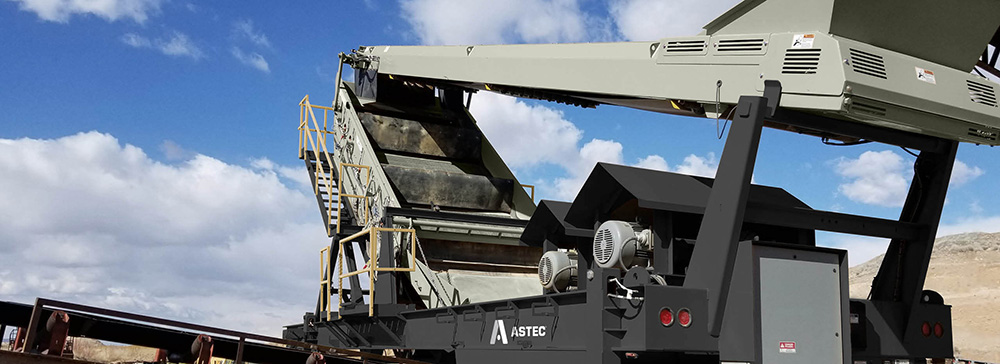
He adds that 90% of Keestrack machines are available in three versions: hydraulic, electric, and zero-emissions plug-in.
“A focus on sustainability is at the core of our company as this is the origin of our business,” Hoogendoorn said.
“Producing and recycling valuable raw materials is what mobile crushing and screening is all about, and our efforts are definitely having a positive impact on the ecological footprint.
“As these heavy-duty industries need very powerful drive systems, Keestrack kept on searching for alternative drive systems,” Hoogendoorn explains.
“From load-sensing hydraulics to e-drives to Zero drives, (Keestrack offers) equipment with no combustion engines on board but only electric motors. This request is also a pull from mostly the North European market. This way we want to protect the planet and save money at the same time.”
He adds that 80% of US customers currently ask for hybrid machines and only 20% electric, but that this is changing with all-electric units becoming more common in the US market every year.
Astec unveiled its newest portable high-frequency screen plant at the ConExpo construction and quarrying equipment event in Las Vegas held on March 14-18.
The machine is equipped with 2.4m x 5.5m top deck and a 2.4m x 3.7m bottom deck, which the US-based manufacturer says makes it the widest high-frequency screen available.
The PTSC2818Vm features externally-mounted vibrators at the ends of the tappets. Astec says this unique design creates a higher G-force and reduces heat load from material to motors as compared to single, centre-mounted vibrators. It also allows for easier maintenance and adjustments. The screen is equipped with hydraulic operating angle adjustment, a fines collection hopper, top- and bottom-deck discharge chutes and an aggregate spreader.
Similar to other PTSC plants, the 2818VM features a nominal 137.16cm x 1,158.2cm delivery conveyor with hydraulic drive and full-length skirtboards. The chassis is fitted with manually-operating support legs, outriggers for additional support and folding walkways along the screen.
The new portable plant is available with a variety of options, including: steel screen cloth, vinyl dust cover, hydraulic levelling jacks, immersion heaters for hydraulic reservoirs, and starters for three off-plant conveyors.
Northern Ireland-based compact mobile crushing, screening and stockpiling equipment maker Screencore is broadening its scope to produce a range of dual-power crushers and mobile pugmills.
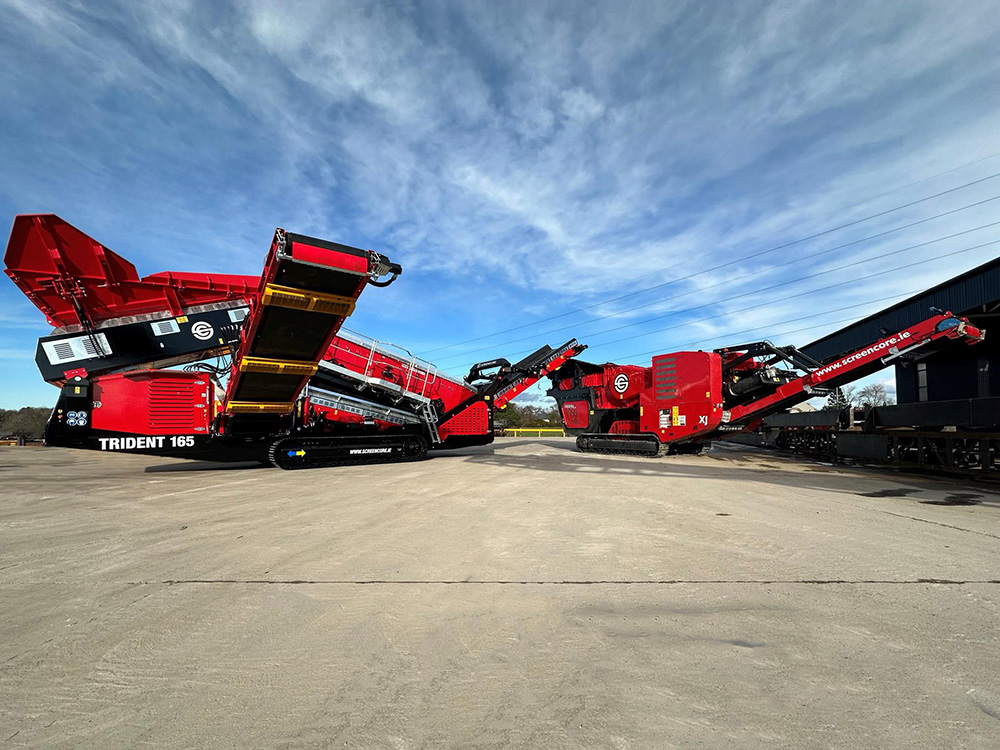
Screencore is located in Coalisland, and although a relatively new entrant into the global crushing and screening market, it has a management team with over 100 years of experience in the industry. The company says this has enabled it to develop a range of mobile – and now stationary – crushing, screening, stockpiling and pugmill solutions in a relatively short period of time.
All members of the range have been designed for users who require a powerful and transportable unit without sacrificing productivity. “Our focus on quality and performance means that our customers can rely on our units getting the job done, no matter where they are located, and virtually whatever the applications,” says company director Ciarán Ryan.
“While our product line has expanded to encompass the formidable 237 trommel and the 30-ton Trident 165 scalper, our fundamental concept remains consistent: simplicity of use."
Ryan says this simplicity is evident in features like hassle-free transport, swift set-up time, intuitive control systems, and distinctive design elements such as full-sized bottom decks on scalpers or augers within the trommel hoppers.
The Screencore range consists of a selection of tracked and highly mobile scalping screens, trommels and compact, yet productive jaw crushers.
Collen Bros (Quarries) Ltd, a family-owned and-operated civil engineering company located in County Armagh, Northern Ireland, recently took delivery of a Powerscreen Premiertrak 600E (PT600E) jaw crusher, which is the first of its kind to be delivered in the UK and Ireland.
The Premiertrak 600E jaw crusher is part of the growing Powerscreen Hybrid range. It has been designed for large-scale operators who require high production in recycling, quarrying, construction and demolition, and mining applications. With significant operational savings, reduced fuel consumption, and ultimately reduced CO2 emissions, this machine is a popular choice for customers who want to maximise efficiency and minimise their carbon footprint.

